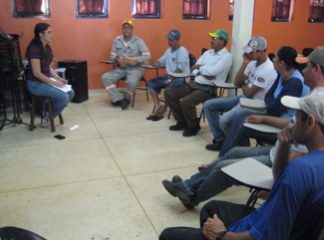Center for Fair & Alternative Trade
Fair Trade USA Certification of Coffee Plantations: A Feasible Solution for Rural Workers’ Empowerment in Nicaragua and Brazil? by Claudia Rosty
Presented by Claudia Rosty, PhD candidate, Department of Sociology, Colorado State University
On Monday, March 28, 2016, Claudia Rosty, PhD candidate and visiting researcher at the International Center for Tropical Agriculture in Cali, Colombia, presented her research entitled, “Fair Trade USA Certification of Coffee Plantations: A Feasible Solution for Rural Workers’ Empowerment in Nicaragua and Brazil?” Rosty conducted focus groups, semi-structured interviews, and unstructured observation in Nicaragua and Brazil on newly certified coffee plantations in order to analyze the impact of Fair Trade USA certification in bolstering workers’ well-being and empowerment.
In 2012, Fair Trade USA began to certify coffee estates after parting ways from Fairtrade International, which up until then organized the certification into a single global system. Historically, the Fairtrade certification has been limited to small-scale producers, however Fair Trade USA argues that the estate certification will expand Fairtrade benefits to marginalized workers.
In the coffee sector, the debate around estate certification is particularly heated because coffee is, unarguably, Fairtrade’s first and most important product. While Fairtrade certification’s most rapid growth is in large enterprises, little is known about the impacts of certified estates in bolstering workers’ empowerment and no academic study has been conducted on Fair Trade Certified coffee plantations.
To address this lacuna, Rosty’s research assesses the impact of the Fair Trade USA certification in promoting workers’ well-being and empowerment in Brazilian and Nicaraguan certified coffee estates. Using a cross-country comparative design and multi-methods qualitative techniques, Rosty’s study demonstrates how the Fair Trade USA certification of coffee estates plays out differently within each national context. The overall findings suggest that the certification contributes to workers’ empowerment particularly through the investment and management of the Fair Trade Premium; however, they shed light on significant empowerment unevenness and limitations.

